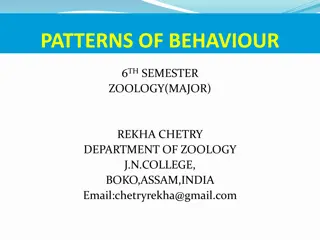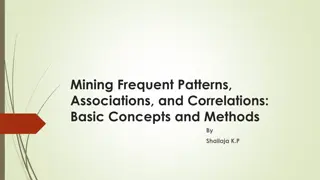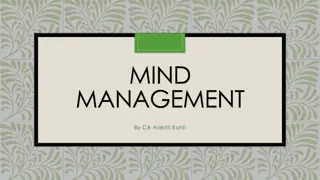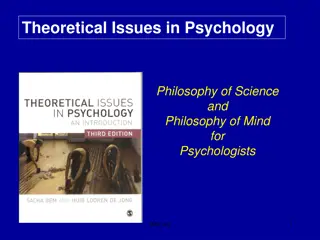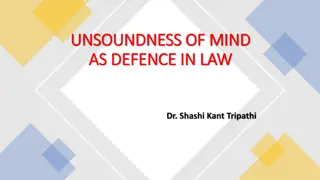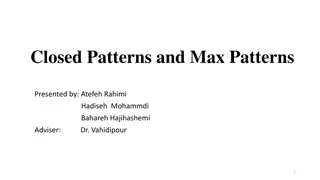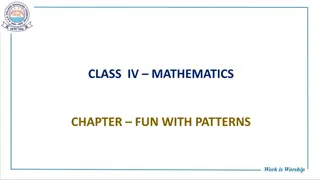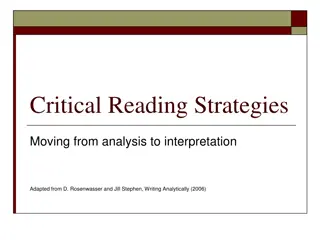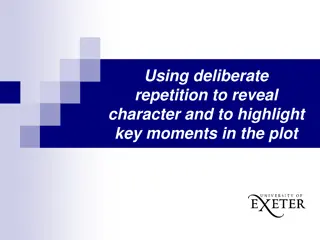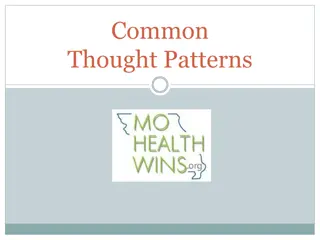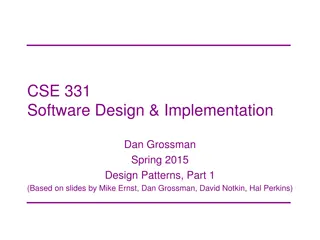Mind Management Skills Workshop: Noticing Stuck Patterns
Introduction to our series of workshops aimed at helping students overcome common problems and stressors. Sessions focus on developing skills to improve well-being without centering on mental health issues or group therapy. Each workshop emphasizes interactive participation and confidentiality. Additional support options are provided for those who may need further assistance. Goals for today include understanding cognitive behavioral therapy concepts, recognizing negative thought patterns, and learning behavioral solutions for change.
Download Presentation

Please find below an Image/Link to download the presentation.
The content on the website is provided AS IS for your information and personal use only. It may not be sold, licensed, or shared on other websites without obtaining consent from the author.If you encounter any issues during the download, it is possible that the publisher has removed the file from their server.
You are allowed to download the files provided on this website for personal or commercial use, subject to the condition that they are used lawfully. All files are the property of their respective owners.
The content on the website is provided AS IS for your information and personal use only. It may not be sold, licensed, or shared on other websites without obtaining consent from the author.
E N D
Presentation Transcript
Mind Management Skills Workshops Introduction: Noticing When We Are Stuck
Introduction to our series of workshops Our clinic Psychological Therapies Training and Research Clinic Our roles: Cognitive Behavioural Therapists and Clinical Psychologists The purpose of these workshops to reach a greater number of students experiencing common problems and stressors To learn ways of overcoming these problems and improving wellbeing in doing so Not mental health problem centred Not group therapy programmes Invitation to learn new skills and meet new people
Housekeeping Today s workshop will run for 90 minutes and is designed to be interactive we encourage participation Confidentiality you are not expected to share anything that you do not want to, however we do request that anything that is shared remains confidential and is not shared with any one else outside of the group Please be respectful of other group members who may choose to share their experiences maintain the confidentiality of the group
Further Support The workshops are designed to be skills-focussed, rather than problem-centred. However, if any of today s discussion or exercises cause you to experience distress, you may wish to pursue further support Full details can be found in the supporting information you received before this workshop Accessing the Student Health and Wellbeing Service Listening services such as the Nightline and the Samaritans How to access evidence-based therapy through the NHS
Goals for today Learn about vicious cycles based on cognitive behaviour therapy To become aware of when we are stuck in a problem causing us to feel distressed- the power of noticing Understand the role of our thoughts, particularly negative thought patterns in how we feel Understand the role of behavioural responses to our problems and learn helpful solutions for change Homework for next session
Why this workshop? Video
What is CBT Cognitive: refers to the thoughts you have about yourself, other people and the situations/events that take place around you. The primary principle in cognitive therapy is that a thought precedes a mood Behavioural refers to what you do or don t do because of how you are thinking or feeling We will explore today how your thoughts, emotions and behaviours are interconnected and possibly keep you stuck in your problems or stressors. We call this the vicious cycle .
Vicious Cycle Unhelpful thoughts and behavioural responses to life s events happen all the time Depending on how the person responds to them, they can pass quickly or linger on, causing greater impact Vicious cycles can occur, between what we think, how we feel and what we do Thoughts, emotions and behaviours
Vicious Cycle Trigger Thoughts Behaviour Emotions Psychological Therapies Training and Research Clinic; School of Psychology
Vicious Cycle Finding out I didn t get a desired job I applied for I m not good enough to get a good job Withdraw from housemates, stop doing things I would normally do Feel low Psychological Therapies Training and Research Clinic; School of Psychology
Vicious Cycle Receiving a critical email from my Supervisor I ve messed this up, I can t do this Put off starting the amendments, distract with other things Feel anxious, overwhelmed Psychological Therapies Training and Research Clinic; School of Psychology
Over to you In small groups of 2 or 3, consider an example of a time that you felt stressed, anxious or low. Choose an example that is not too uncomfortable to reflect on and consider: - What situation, event or trigger was happening at the time? - What thoughts were going through your mind then? - How did those thoughts make you feel? (emotionally and/or physically) - How did the way you were feeling make you behave? What did you do at the time? - Were you in a vicious cycle?
The power of noticing Thinking something, and noticing that you are having a thought can be very different experiences Noticing your thoughts can help you to step back and reflect on what your mind is doing, rather than being embroiled in unhelpful thoughts Becoming aware of the thought Experiencing it less intensely Being aware of it without engaging fully in it Seeing it for what it is an event in your mind, rather than an objective fact This can allow us to respond differently to our vicious cycles Psychological Therapies Training and Research Clinic; School of Psychology
The River Psychological Therapies Training and Research Clinic; School of Psychology
What if I mess up this assignment? I m never going to be able to answer their questions She always seems to know more than me I m terrible at this! I m never going to have enough time to finish I am noticing that I am having the thought that Psychological Therapies Training and Research Clinic; School of Psychology
The Importance of Thoughts The mind is its own place, and in itself, can make heaven of hell, and a hell of heaven John Milton
The Importance of Thoughts 50,000 70,000 thoughts a day most of which just appear in our mind, they are automatic Thoughts appear to be our voice of reality or facts It is our thoughts and interpretations of events, situations and ourselves that informs our emotional and behavioural responses not the events themselves Thoughts can be unhelpful or untrue We will explore common unhelpful patterns of thinking
Unhelpful Thought Patterns Mental Filter When we notice only what the filter allows or wants us to notice, and we dismiss anything that doesn t fit . I.e. when we think we are stupid, we look for evidence to support it Prediction Believing we know what the outcome of something will be or what will happen in the future. I.e. I will fail Mind-Reading Assuming we know what others are thinking (usually about us) i.e. they don t like me Compare and Despair Seeing only the good and positive aspects in others, and getting upset when comparing ourselves negatively against them Critical self Putting ourselves down, self-criticism, blaming ourselves for events that are not entirely our responsibility Should s and musts Thinking I should ( or shouldn t ) and I must.. i.e. I must put pressure on myself to meet expectations Judgements Making evaluations or judgments about events, ourselves or others rather than describing what we may have evidence for Emotional Reasoning I feel bad so it must be bad i.e. I feel anxious so something bad is about to happen Mountains and Molehills Exaggerating the risk of danger or the negatives and minimising positives or how likely things will be to turn out Catastrophising Imagining and believing that the worst thing will happen Black and white thinking Believing that things or ourselves are good or bad, right or wrong with no in- between or middle ground Memories Current situations and events can trigger upsetting memories, leading us to believe that it is happening again which can cause distress
The River Psychological Therapies Training and Research Clinic; School of Psychology
Exercise Ways we can distort our thinking Going back into your groups, consider your thoughts from your vicious cycle and if they reflect a unhelpful thinking pattern/s Consider: What kind of unhelpful pattern could these thoughts fit? How often do I find myself thinking in this particular pattern? Are there any other unhelpful thinking patterns that seem familiar to me in other situations? What kinds of situation or events make me likely to think in these patterns? If I am noticing that my thoughts likely reflect an unhelpful pattern, what would be a helpful way of responding to this situation?
The Importance of Thoughts Don t believe everything you think Our thoughts are simply the way we interpret ourselves and our surroundings. When we believe our thoughts automatically, they can influence the way that we feel, and how we behave. This becomes cyclical when the way we behave only further strengthens the way that we think Consider this when you avoid something you are scared of what happens to what you are scared of? The skill of noticing and reflecting on your thoughts will give you more power over how to respond to them.
The Importance of Behaviours As discussed, the way we behave is influenced by our thoughts and feelings. Our behaviours can also contribute to the way that we think and feel. We want to learn to notice our behaviour and reflect on the consequences it causes: - For how we think - On how we feel - On the situation we are in
The Importance of Behaviours Passive Active Over working, doing everything yourself Gathering lots of information and preparing prior to attempting something Going over and over work and/or other things, checking Seeking reassurance Taking control, perhaps doing things for others Procrastinate, put things off Ruminating over past events rather than focusing on the here and now Avoid fully committing to things Finding excuses to not to certain things
The importance of behaviours Possible Function (intended consequence) Thought If I think this way I will work harder, if I work harder I will not be exposed as a fraud I am not good enough for this, my supervisor is going to find out I am a fraud Emotion: Anxious Get temporary relief from distress and uncomfortable thoughts Behaviour Unintended consequence Burnout, anxiety, stress zone Overcompensate, (more hours spent working) [approach behaviour] Low Mood, negative thoughts. Task remains undone Procrastinate, avoid task at hand [avoidance behaviour]
Over to you Look back at your earlier thoughts feelings and behaviours map, was your behaviour an avoidance or procrastination behaviour? or a doing/approach behaviour in response to your trigger? Is this typical of you? Using your hand out (3) in your groups of 3-4, consider: What was the function of what you were doing? What was your intention in this behaviour? What were the possible unintended consequences of this?
Key Messages The way we think affects how we feel and what we do What we do will affect the way we think and how we feel Learning to notice and reflect on the interactions between our thoughts, feelings and behaviours helps vicious cycles to slow down and gives us opportunities to influence what happens This series of workshops will help you learn ways of managing these cycles in different areas of life
Homework Notice Using your handouts, throughout the week use the blank vicious cycle diagrams to record your thoughts, feelings and behaviours when you notice you are stressed, upset, anxious etc Label your thought with a possible unhelpful pattern type Ask yourself, was your behaviour helpful, and did it work Try to complete the exercises live, in the moment your thoughts, feelings and behaviours are occurring This will be reviewed in the next session
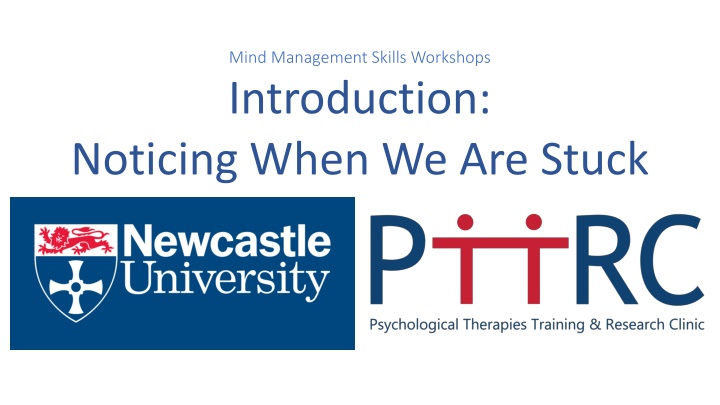

![[PDF⚡READ❤ONLINE] Zen Mind, Beginner's Mind: 50th Anniversary Edition](/thumb/20459/pdf-read-online-zen-mind-beginner-s-mind-50th-anniversary-edition.jpg)

